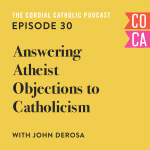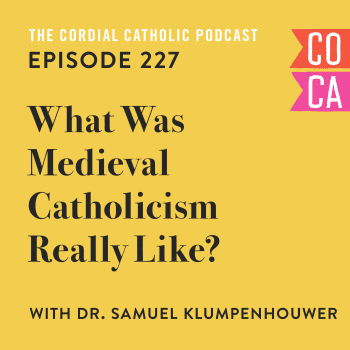
I love speaking with Steve Weidenkopf. He’s one of my favourites of all time.
Steve engages with history—whether its ancient Christianity, the Crusades, or the Reformation—in a critical, clear-eyed, no-agenda approach that’s so sorely lacking in most secular histories. And through this presentation of history, digging into the primary sources wherever he finds them, Steve presents a picture that’s often, as a result, at odds with many popular narratives.
Were Easter and Christmas borrowed from popular pagan holidays, repurposed by early Christians? We hear this often, don’t we? But, no, says Steve and the evidence is ridiculously absent for any such claim.
Were the Crusades really a bloody rampaging of evil Catholic warriors upon hapless populations? Another popular presentation of history? But again, not so much.
But when I sat down to talk with Steve about some of the so-called “mythicism” of Early Christianity he explained, in his trademark charity and clarity, how to quite easily defeat the central claim of those that would dismiss Jesus as mere mythology: did anyone think that at the time?
Did anyone living contemporary to Jesus and his apostles, or even shortly after, dismiss Jesus as a myth or legend.
The answer is, no.
Mythicism, at its core, is the argument that Jesus was merely a myth—not a real historical figure. It’s a growing movement, buoyed in large part by Evangelical Christians who have grown to reject the faith of their upbringing for a variety of reasons. In some cases, a rigid, often literal reading of the Bible, leads to such a preposterous number of conundrums, seemingly incongruities and impossibilities, that the only option seems to be a complete rejection of the Bible itself.
“The Bible says this, and this, and this, and it can’t mean it all so it can’t mean anything.”
It’s a false problem, in reality, because the conundrum should be stated as, “I think the Bible says this, and this, and this…” which leads, logically, to the realization that there are different ways to interpret the Bible and maybe we’re just doing it wrong.
It’s a position I completely understand and one that let me, ultimately, to a new way of understanding my faith altogether—in the ancient Catholic faith which has satisfying answers to many of the problems presented by a literal interpretation of Scripture.
In any case, the mythicism movement is growing in popularity.
But does it really have legs?
No, says Weidenkopf.
Digging into the historical records, into the primary sources, as he is so good at doing, Weidenkopf comes up with an incredible picture: no one, historically, is arguing like this.
No one, at the time of Jesus or shortly thereafter, argues that Jesus did not exist.
And here is the crux, in one sentence or less: if Jesus did not exist why doesn’t anyone just say that?
There are, after all, plenty of sources even outside of the biblical narratives that attest to Jesus’ existence. In addition to the Gospels, which mythicists would reject outright, several sources written around the same time do indicate that a person named Jesus lived, gained a large number of followers in a short amount of time, and died.
But no one disputes his existence.
If Jesus was just a myth, says Weidenkopf, well then why didn’t any of the ancient writers, critical of Christianity, just say so?
But they don’t. Not even Jewish writers highly critical of the movement as a whole.
The reality is that there are no ancient sources which make the claim that Jesus was a myth—and wouldn’t that be the easiest way to discredit the whole Christian thing from the start?
Here, some might claim that a great fire or flood or vast conspiracy destroyed all of the evidence which did say that Jesus was merely a myth. That scores of ancient writers went to great lengths to show that Christianity, and its founder, was a myth and that these writers have been whitewashed from time and memorial is a great, fantastic conspiracy theory. But a conspiracy theory it is, and where is any proof?
Besides, says Weidenkopf, is there any evidence that the Church does this kind of thing? You can’t swing a dead fish without encounter one of the millions of times the Catholic Church has embarrassed itself—why aren’t any of these instances washed from the annals of history if the Church possessed such power?
The conspiracy falls very short.
Besides, the idea that Jesus never existed is, academically speaking, not taken very seriously.
Even Richard Carrier, one of the more vocal proponents of the “Jesus never existed” movement, claims only seven academics believe that Jesus never existed. In other words, only seven people with credentials and research to back them up say Jesus’ existence is a myth. And Carrier provides this number to seemingly lend credibility to his position. But, really, only seven?
The number of academics on the other side of the debate would number in the thousands.
That Jesus existed as a real, historical figure, we can rest assured. And like the supposed pagan origins of Christmas and Easter, like the polemically charged retelling of stories from the Crusades or the heroic roots of the Reformation, the truth is often even more demanding than what you may have been told.
And begs some important questions.
For more, listen to Steve Weidenkopf by clicking here or below,












